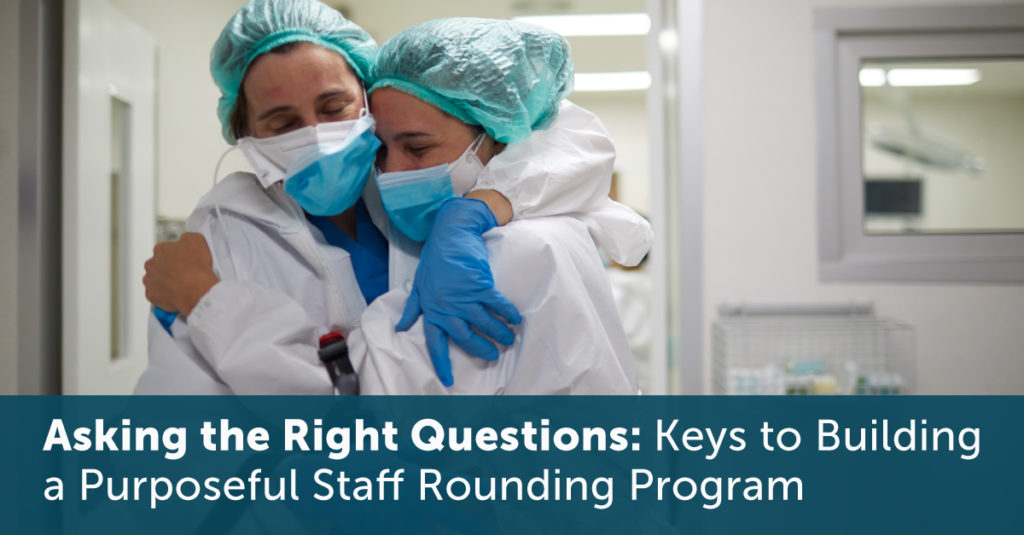Hospital team members are understandably concerned about their own well-being after a year leading the fight against COVID-19. Struggling with the emotional weight of that burden has taken its toll, with depression, anxiety disorders, substance abuse, and even post-traumatic stress disorder being reported at shockingly high levels.
It’s critical, now more than ever before, for hospital leaders to truly understand the concerns of their staff members and colleagues – not only to provide support and connect them with resources and help, but also to improve staff satisfaction, build a culture of trust, reduce turnover, and develop a team of caregivers best-suited to delivering engaging patient experiences and improving patient outcomes.
That can be achieved through hospital rounding as well as staff rounding, using the same basic technology and processes that caregivers leverage to round on patients. But to truly be effective, staff rounding must be purposeful, dynamic, and compassionate. Truly purposeful staff rounding can engender considerable benefits:
- A culture of transparency and the ability for staff members to be heard without fear of retribution
- A leadership team that is viewed as approachable and supportive
- Strengthened relationships between care teams and executive leadership
- Identification of systemic trends in need of corrective action
- Recognition and genuine appreciation of the extraordinary efforts of healthcare professionals
- Higher staff retention, skill level, and improved satisfaction
So how can you make staff rounding purposeful? It comes down to empathy and making a personal connection. Be present – show that your interaction is your priority. Explain the purpose behind staff rounding – for you to address personal or professional concerns and provide the resources for staff members to do their jobs safely. Many are dealing with new and unexpected social determinants, including income challenges if a partner lost a job, caregiving duties for elderly ailing parents, balancing childcare and new educational responsibilities, food and health insecurities, and more. Here are some considerations for designing a staff rounding program and asking the right questions.
Make safety your priority
Workplace safety is a prerequisite for staff well-being and satisfaction, and it should be a topline mission of any staff rounding program to give staff members a welcoming forum to air any safety concerns. Ask staff members if they have any safety concerns, and aim for specificity – do their concerns relate to employee safety, patient safety, resources and equipment, staffing levels, visitor safety, facility and grounds safety, or any other area? Give staff the space to provide as much detail as they can.
Seek honest feedback
A staff rounding program will only succeed if it’s carried out unflinchingly. Form hypotheses about your weak spots: Are new staff members being properly supported during onboarding? Are they missing key resources to handle their patient loads, including key competencies and support staff? Home in on your potential blind spots, demonstrating to staff that you’re not only willing to discuss potential shortcomings, but also looking to systematically address them.
Introduce PTSD screens
A shocking 23% of frontline healthcare workers are suffering from post-traumatic stress disorder. As insidious and prevalent as PTSD is becoming, screening needs to become regularly integrated directly into workflows. For the sake of clarity and accuracy, use standard PTSD screening scripts, but conduct screens at a frequent cadence.
Focus on the little things
Frontline staff have been firing on all cylinders for over a year. The non-clinical, non-work moments of their days are integral to maintaining their well-being, but can easily be lost in the shuffle amid the sometimes chaotic nature of high-stress clinical work. Ask if they have been skipping lunch or if they’re getting enough bathroom breaks. Ask what else the hospital can do to ensure they have everything they need during the day.
Go outside the four walls of the hospital
Your staff members spend a lot of time at work, especially since the beginning of the pandemic, as resources have been challenged and many have had to cover for sick colleagues during extremely busy periods. Still, they spend most of their time outside your four walls. Ask whether they have gotten enough rest. Have they been able to take care of their family? Do they need any type of assistance at home?
Recognize excellence everywhere
Lack of appreciation can be a core driver of low job satisfaction and turnover. Through your staff rounding program, offer employees the opportunity to nominate any of their colleagues for recognition. By publicly sharing positive stories and shining the spotlight on employees that go above and beyond the call of duty, you can simultaneously boost engagement satisfaction and incentivize quality care.
Find out today how CipherHealth’s Staff Well-Being solutions can help you understand, support, and retain your staff, now and in the future. Learn more about staff wellbeing today.








